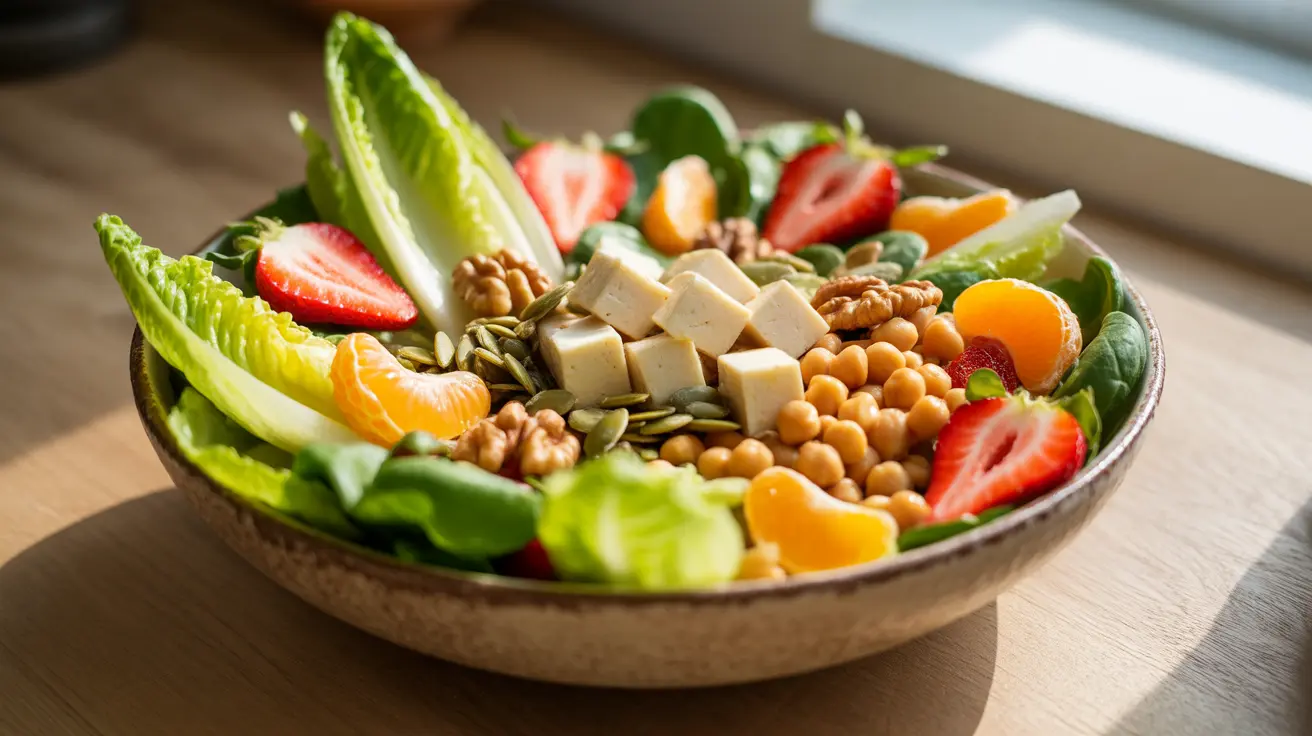Creating a truly nutritious and satisfying salad goes far beyond just tossing together some lettuce and dressing. The right combination of salad toppings can transform a simple bowl of greens into a nutrient-packed, flavorful meal that keeps you energized throughout the day.
In this comprehensive guide, we'll explore the most nutritious and delicious salad toppings that not only enhance flavor but also boost your meal's overall health benefits. From protein-rich options to heart-healthy additions, you'll discover how to build the perfect salad.
Protein-Packed Toppings for Sustained Energy
Adding protein-rich toppings to your salad helps create a more filling meal that keeps you satisfied longer. Consider these nutritious options:
- Chickpeas (7g protein per 1/2 cup)
- Black beans (8g protein per 1/2 cup)
- Grilled tofu (10g protein per 3 oz)
- Edamame (8.5g protein per 1/2 cup)
- Hard-boiled eggs (6g protein per egg)
For optimal nutrition, aim to include at least one protein source in every salad. Plant-based options like beans and tofu are excellent choices for vegetarians and vegans, providing not only protein but also fiber and essential minerals.
Heart-Healthy Nuts and Seeds
Nuts and seeds add satisfying crunch while delivering healthy fats and important nutrients. Include these powerhouse toppings in moderation:
- Walnuts (rich in omega-3 fatty acids)
- Pumpkin seeds (high in zinc and magnesium)
- Almonds (excellent source of vitamin E)
- Sunflower seeds (packed with healthy fats)
- Chia seeds (high in fiber and omega-3s)
A serving size of 1-2 tablespoons is typically sufficient to reap the benefits without overdoing the calories. Toast nuts lightly to enhance their flavor profile.
Colorful Fruits and Roasted Vegetables
Adding fruits and roasted vegetables increases both the nutritional value and taste complexity of your salad. Consider these combinations:
Fresh Fruits
- Mandarin oranges
- Sliced apples
- Fresh berries
- Pomegranate seeds
- Pear slices
Roasted Vegetables
- Sweet potato cubes
- Brussels sprouts
- Butternut squash
- Bell peppers
- Roasted beets
Roasting vegetables brings out their natural sweetness and creates a more satisfying texture. For fruits, choose seasonal options that complement your other toppings.
Healthy Homemade Dressing Options
Create nutritious dressings using these healthy fat sources:
- Extra virgin olive oil base
- Avocado oil
- Greek yogurt
- Tahini
- Mashed avocado
Combine these bases with vinegar, citrus juice, herbs, and spices for endless variety. Aim for a ratio of 3 parts oil to 1 part acid for balanced flavors.
Frequently Asked Questions
What are the healthiest salad toppings to add for extra nutrition and flavor? The healthiest salad toppings include lean proteins (beans, tofu, eggs), healthy fats (nuts, seeds, avocado), and colorful vegetables and fruits. These provide essential nutrients while keeping calories in check.
How much protein can I get from beans or tofu in a salad, and are they good vegetarian options? A half-cup serving of beans typically provides 7-8g of protein, while 3 oz of tofu offers about 10g. Both are excellent vegetarian protein sources that also provide fiber, minerals, and other nutrients.
Do nuts and seeds on salads help with heart health, and how much should I add? Yes, nuts and seeds contain heart-healthy fats and fiber. Add 1-2 tablespoons per serving to benefit from their nutrients without excess calories.
What are some easy ways to make homemade salad dressing with healthy fats? Combine extra virgin olive oil or avocado oil with vinegar or citrus juice, then add herbs and spices. Greek yogurt or mashed avocado can create creamy dressings with healthy fats.
Can adding fruit or roasted vegetables to salads make them healthier, and which types work best? Yes, fruits and roasted vegetables add essential vitamins, minerals, and fiber. Berries, citrus fruits, roasted sweet potatoes, and bell peppers are particularly nutritious choices that complement most salads.




